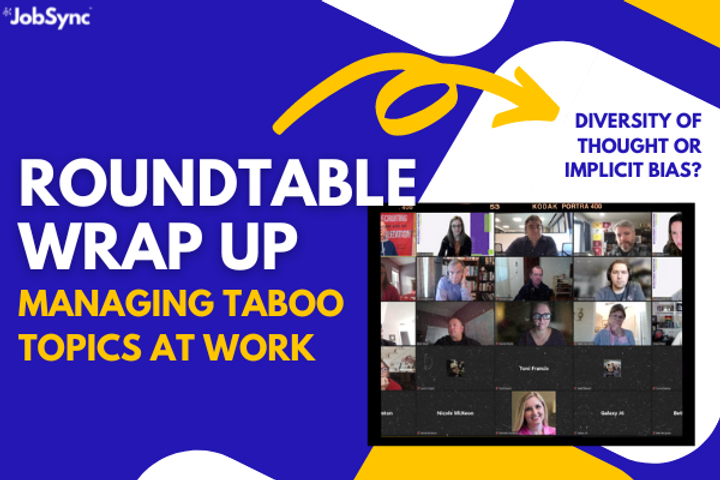
When you take on taboo topics, led by the incredible Hung Lee of Recruiting BrainFood, you get a conversation rooted in dissension, anxiety, and charged topics – but you know it’s going to be good. Add in open mics and cameras on and it’s enough to cause anxiety in even the coolest marketer.
Taking a step back, how do you hire and successfully retain employees in an environment where: your company may have visibly or invisibly charged positions and you can’t do/say/decide on certain things or even ask certain things? Yet to successfully hire and retain you need everything to be out on the table.
Should companies’ politics impact hiring decisions?
Is it better to declare a ‘no politics zone’ or state how your business leans on certain topics? Can you even make this decision or in this Twitter world, has the transparency already been declared and the decision is actually to amplify the company’s position or tamp it down?
Any way that you come at this incredibly complex issue – it all comes down to culture, which in turn means transparency, neither of which is achieved overnight and neither of which is rooted in finality but always a moving target.
It comes down to a few questions:
-
Do you want a homogeneous group of employees who generally work well together, think similarly, and promote a culture of agreement?
-
Do you want a culture of ‘safe’ and ‘unsafe’ topics? How do you manage this when employees have personal Facebook, TikTok, and Twitter accounts?
-
Do you fully embrace differences of thought, opinions, backgrounds, and political positions? Or maybe only some?
-
Are all political positions equal in your business? Do you give the same berth to your gay employees as your homophobic employees? What about your female/feminist employees versus your misogynist employees?
Then you have disagreement vs. liability. There is a point where the business’ position on certain topics may lead it into legal hot water. How do you (or can you) manage a leadership team who may take positions that are no longer a position but a liability?
“It also comes down to the corporate culture.” – Jackie Lopez
The thing about taboo topics is that they cut through all the BS and really define the culture that is your business. When you are at the front end of bringing in new candidates, how to handle this should be at the forefront of your thinking. You need to start with an honest inventory of your business and where the business (and leadership) falls on a number of these:
-
Are you a political organization – does the organization lean left or right?
-
Is your organization religious-based and therefore unintentionally political?
-
Does your organization embrace DE&I, pride month?
-
Is your organization pro-gun? Pro-choice?
Any of these can lead to employees butting heads and bringing their politics into the workplace – either directly or indirectly because of who they are, their public persona, and how they are as a human. But it’s more than that. Sometimes your humanness runs afoul of the thoughts and opinions of others. There is a limit to what a company can control – legally – as they hire people.
The expectation that employees leave their humanness at the door is unrealistic in nearly all work environments. But it goes both ways – it’s not just candidates, it’s also your hiring managers. They walk into every interview with their own biases – biases that contribute to your culture.
How to (legally) bring politics into the hiring process
What can you do – ban taboo topics or lean in? And, if you lean, in what does that mean? Can you define culture and transparency? Should culture be who you are or who you aspire to be?
“The opposite of sitting on the sideline has been Kraken recently sharing a very clear guide of where they sit politically with “anti-woke” stance.” – Serge Boudreau
Many companies have done it. Regardless if you agree or disagree with their position, companies like Chick-Fil-A and Hobby Lobby have publicly stated their political and religious positions. Even unintentionally, companies are making their positions known through changes to their logos, commitments to DE&I and pay transparency, culture statements, missions, and stated values. All of which can help candidates do their research.
“It’s pretty basic: Do your homework beforehand!” – David Anderson
Yes, candidates do their research and you should help them. If at a minimum, you can be clear about any position that your company embraces in which they expect no dissent, that is the place to start. It is disingenuous to hide your business’ position on a controversial topic – even if the company doesn’t feel that it is controversial.
Conversely, if your organization has taken the opposite position – embrace diversity of thought, do you hire everyone? What about people who can’t lean in and learn from the other side?
Which leads to the other side of this coin – what do you do when candidates disclose their position to you or the interviewing team? What if what they tell you means they will disrupt the homogenous nature of your business? Can you/should you determine them a non-culture fit?
For many companies’ the culture shift is not on WHAT you think, but HOW you think. Are you open-minded or are you set in your thinking? Can you set aside your thoughts and learn from the other person? Can you carry a charged conversation with a measured tone and approach to building bridges?
Culture fit is a catch-all of reasons not to hire someone – and it often means ‘not like me’. Companies that define culture as a way to solve problems, as opposed to personality traits or belief systems, can find that balance. But that also means training, training, training – and if that doesn’t work, establishing processes on how to work with [or not work with] people who can’t align with an open-minded approach to working with others.
“This is a super complex topic – any political perspective that you take you risk alienating 50% of your potential market and your employee pop. However, organizations have a set of values that guide their business and they’ll need to take a stand on certain issues in order to maintain those values and their CSR.” – Zachary Larson

